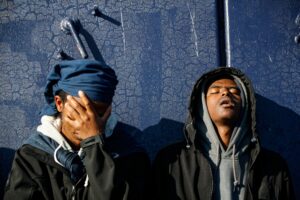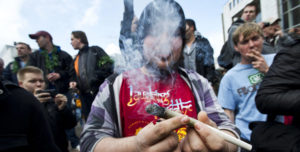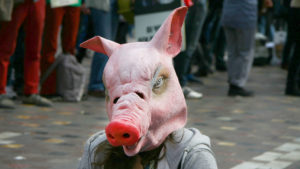“Sweet Caroline…” bellows the crowd. “Good times never seemed so good!”
Times are indeed pretty good for Caroline van der Plas. Surrounded by the thousands of blooms that adorn the Royal FloraHolland Trade Fair, the leader of the BoerBurgerBeweging (BBB), the Dutch farmer-citizen party, is here to baptise a new pink rose named in her honour. She’s also here to rally support among the nation’s sympathetic flower-growers before this month’s general election.
“Farmers are fighting hard,” she tells them. “Not just to survive — but also for the environment and for the energy transition. We will keep representing the voice of common sense in the years ahead.”
In the splintered political landscape of the Netherlands, this voice of the countryside has spent the past years thrusting itself into the mainstream. In March, as the Dutch government formulated plans to buy out thousands of “peak polluter” farms, the BBB soldiered on, winning the nation’s regional elections and seizing the biggest share of the Dutch Senate.
Since then, some of her supporters have recently switched to another new party, Pieter Omtzigt’s centre-right New Social Contract, wooed by his growing reputation as a corruption-buster and strong showing in the polls. But the BBB is still set to win up to 11 MPs on November 22, a huge gain on its single seat in the last general election. In the Dutch system of proportional representation, there is a high chance that it will be invited to be part of the next coalition government.
To do so, however, the BBB will need to shake off its association with the radical Right groups who joined its farmer protests last year. When I put this to Van der Plas, she downplays the risk. “That’s simply not true and I always get a bit cross about it,” she says. “If you look at our voting behaviour and what we do, we are a centre-right party.”
Today, the BBB has expanded from the single issue of farming. Its representatives frequently talk about a “noaberstaat” (a state based on a traditional sense of community), more power for parliament, pro-business policies and an increased social safety net. It also wants to limit asylum to 15,000 migrants a year and impose housing rules for labour migrants. All form the basis of its election manifesto, which party officials refused to have costed by independent economists. “We don’t speak in woolly words,” Van der Plas explains. “We speak the language of the people on the street. And that appeals to a lot of people.”
Her programme certainly appeals to the crowd watching the “Sweet Caroline” rose being christened. “It’s good that she is here,” Arno Heemskerk, an orchid grower from Zevenhuizen says. “There are some who would rather get rid of the farmers and the growers, and we are made out to be big polluters. Of course, we need to do something for the climate, but if there’s one sector that has been busy for years, it is the horticultural sector. We need to make the transition but we need more time to do it.”
One rose grower, who wishes to stay anonymous, suggests that support for the BBB is also motivated by a fear of the Left. He’s particularly concerned about the return of Frans Timmermans, a former European politician who headed up the European Green Deal and now leads a new GreenLeft-Labour coalition. “We are busy seven days a week producing these roses,” he says. “Anyone but Timmermans. We are afraid of him.”
Steven Van Schilfgaarde, chief executive of Royal FloraHolland, is more optimistic about Van der Plas. “What I see in the BBB is that they want to listen, they have a warm heart for the sector and they understand its economic importance for the Netherlands,” he says.
As the world’s second-largest agricultural exporter, farming has always been a central pillar of Dutch politics. But it also remains a divisive issue. As well as making up some 1.4% of the country’s GDP, it is also responsible for nitrogen-based and phosphate emissions and a major contributor to unlawful levels of damage to protected nature reserves. In response, the BBB does not deny that the farming sector needs to reduce pollution, but instead believes that this must happen more slowly, giving farmers “perspective” on future income rather than just buy-outs to stop.
By doing this, says Bart Koenen, a researcher at Kantar Public, the BBB is attempting to distance itself from its depiction as a radical protest party and brand itself as a voice of common sense. “We have had four [Mark] Rutte governments and the need has grown strongly for a new kind of politics, new faces, a more transparent government,” he says. “It is quite a Left-wing party on social security, access to medical care and affordable transport, and so it’s in a position to speak to a large proportion of the electorate in the cities. But on the other hand, it wants a quota on migration, scoring well with the Dutch public because a lot of people find immigration a big problem that hangs together with a huge housing shortage.”
He points out the BBB’s approach to scrapping nitrogen pollution rules — which currently restrain speeds on motorways and house-building — plays well in solving the country’s lack of an estimated 390,000 homes. “The BBB says that the nitrogen pollution problem isn’t important: we need to build houses.”
In the hope of making this happen, Van der Plas has spoken openly about a potential coalition with Omtzigt’s New Social Contract, which is campaigning primarily around better governance after a series of expensive government scandals over childcare benefits, the Groningen gas wars and unpopular Covid lockdowns. Sarah de Lange, professor of political pluralism at the University of Amsterdam, sees new voices on the centre-right thriving following the total collapse of traditional government parties. “The far-Right in itself is not doing that great, contrary to popular narrative,” she says. “But that is because other parties are doing so well. The core message of the BBB is about the good people in the countryside or provinces who have common sense, against the cosmopolitan elite that is neglecting part of the country. It is agrarian populist with far-Right leanings on some issues [such as immigration].”
But Van der Plas, a charismatic and straight-talking figure, is working hard to appeal in the cities too. After the flower presentation, a swig of fizz and a mint, she will be whisked off to a photoshoot outside the massive trade fair. Later, she will take off her Doc Martens to have tea in her socks in a caravan with a community of travelling people in Amsterdam.
Joining her out campaigning, Claudia van Zanten, a former councillor for the liberal VVD in Amsterdam and seventh on the BBB candidate list, says it is a party of business that does not just appeal in the countryside. “BBB is a party of the community that is committed to all residents of the Netherlands, farmers and citizens,” she says. “We want a smaller government with fewer civil servants and impossible rules… that pays attention to the human dimension again.” It’s a message, she points out, that did well earlier this year in parts of Amsterdam Municipality such as Weesp. And it appears to have established a stable level of support elsewhere; Van der Plas in particular won public admiration over summer, when she claimed she had no desire to be prime minister, tottering around and abroad “in high heels”.
“I’d never have thought that this would have happened when I was a little girl,” she tells the crowd as she pours pink fizz over a bunch of “Sweet Caroline” blooms intended for her Irish mother. “I am going to tell her: ‘Your daughter has her own rose!’” And when election results are in and coalition negotiations start, she may well find she is coming up roses too.
Disclaimer
Some of the posts we share are controversial and we do not necessarily agree with them in the whole extend. Sometimes we agree with the content or part of it but we do not agree with the narration or language. Nevertheless we find them somehow interesting, valuable and/or informative or we share them, because we strongly believe in freedom of speech, free press and journalism. We strongly encourage you to have a critical approach to all the content, do your own research and analysis to build your own opinion.
We would be glad to have your feedback.
Source: UnHerd Read the original article here: https://unherd.com/




